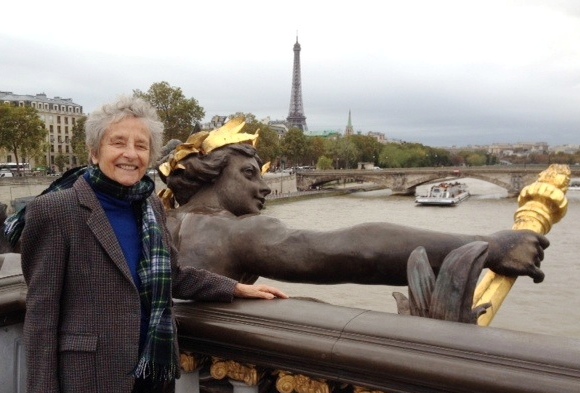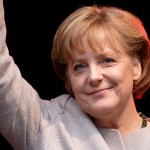
For the French, Germany can be a source of admiration or of irritation . The Franco-German “couple” has been the pillar of the European Union (EU.) The couple worked beautifully until the departure respectively of Francois Mitterand in 1995 and Helmut Kohl in 1998. Today more than ever, the two countries need to spearhead initiatives to bring about a new Europe.
Marcel Fratzscher , president of the German Institute of Economic Research, writes on April 6, “Without a strong France, Europe cannot pull out of the crisis. We need France to play the role of a leader with a vision of the European project.” Without agreeing on everything, the two countries have a lot to learn from each other.

Chancellor Angela Merkel, head of the Christian Democratic Party (CDU), will run for a fourth mandate next September. Hans Stark, professor of Germany civilization at the Sorbonne, believes the Germans have not had enough yet of Merkel and will elect her again, possibly for the last time. Her hold on the people is still strong as showed in the CDU winning 40 percent of the votes in the recent Saarland elections. The Social Democrats (SPD) tried to form a coalition with the Left (die Linke) and the Greens, but failed.
Merkel is pragmatic in her policies. For instance she moved from the center to the left (stepping on Social Democrats’ turf) by adopting ideas attractive to the left such as the acceptance of same-sex marriage or opposition to nuclear arms. In a nutshell, she remains in the center but maintains a slight tilt toward the left.
Her longevity is explained by her ability to create consensus. She has to be an acrobat to lead a country made up of 19 States (Länder), six of them having come from East Germany and 13 from West Germany.
It was the intention of the Allied forces occupying Germany to create a multitude of “checks and balances” in order to decentralize power by adding to the number of Länder already existing before the war. Sailing on the Danube one can see the splendid architecture left by the powerful Prince-Bishops ruling Wurzburg or Bamberg länder. The voting system by proportional ballot creates the need for coalitions and hence a fragmentation of power.

The main opponent of Merkel in next September’s election will be Martin Schultz, who has just been elected as the president of Social Democrats (SPD) with 100 percent of the votes. The SPD plummeted after the unpopular reforms made by Gerard Schroder but has now bounced back. Today the CDU and SPD are running neck and neck, each with about 33 percent of the electorate.
The right wing populist party “Alternative for Deutschland ” (AfD) represents 9 percent of the vote. It was not founded until 2013. Since the end of the war, Germany has had to live with certain taboos and one of them, was the aversion to any political system reminiscent of fascism or communism. Today the former East Germany is more populist than West Germany. By way of example, in the last elections in Saxony-Anhalt, AfD received 25 percent of the vote.
Germany is an economic success story, but at what price? The system, called Hartz I-IV, implemented by Gerard Schroder in 2003, consisted of tough labor reforms and imposing sacrifices on the work force at a time when Germany was called the “sick man of Europe.”
But the results were indeed striking: unemployment went down by half and is now only 5.9 percent, exports have risen by 6 percent creating a trade surplus of 250 billion, and growth is at 1.9 percent. Alexandra Spitz, a German professor of economics, published an article in the Harvard Business Review on March 13, 2017, titled, “The Real Reasons why the German Labor Market is Booming.” In summary, she explains these reasons are that wages have not increased as much as productivity; collective bargaining between employers and employees is decentralized, and workers have accepted lower salaries and flexible labor conditions.
Some of the French, who have a generous (perhaps, too generous?) “social model,” believe Germans have very low unemployment, but also millions of “poor workers” with many part-time, low-paid and short-duration jobs. Other French people do not agree and are impressed by the German performance and willing to borrow some of their ideas.
Thierry Pech, head of the Terra Nova Think Tank, notes, “There has been an internal devaluation of the cost of labor because of the “poor workers.” This policy can be called “mercantilism.” It was used to boost the competitiveness of both industry and exports. This caused a problem for the European neighbors. Germany is preoccupied with its own national interests and has displayed a lack of cooperation with others. “Professor Hans Stark argues, “In 2004, the Eastern European countries, which joined the EU had low wage-economies. This time it was Eastern Europe’s turn to practice mercantile policies toward Germany.”
“Qualified workers have access to professional training at any time,” Professor Stark remarks. “Those persons, less qualified but having completed their “cursus,” can benefit from apprenticeships. Those, without any qualification, fall to the bottom of the pile. German industry is always looking for qualified workers. In the sectors where labor is not qualified – construction, services, agribusiness – the salaries remain low. This may constitute a problem for French farmers for instance.” A minimum wage was introduced in 2015.

Sigmar Gabriel, former president of SPD and now German minister of foreign affairs, says, “Let us stop thinking we are the cash cow in relation to the European budget. We have also profited from Europe, particularly when the 1999 introduction of the Euro presented a devaluation from the Deutsch Mark.”
Germany has been cautious not to increase its military power (another taboo.) The Parliament (Bundestag) has blocked the increase of the army (Bundeswehr.) The government abstained from taking part in the Libyan campaign. Now the defense of territory is becoming a priority again. Four brigades have been deployed to defend the Baltic states from Russia.
President François Holland invited the leaders of Germany, Italy and Spain, to a mini-summit in Versailles on March 6 to discuss European defense. Soon after, during an informal meeting in Malta attended by several EU leaders, Merkel declared, “There will be a European Union at different speeds.”
Clearly, this seems to preview what Europe may become – a number of core countries of the EU, working together on specific projects.
Editor’s Note: This is the opinion of Nicole Prévost Logan.
 About the author: Nicole Prévost Logan divides her time between Essex and Paris, spending summers in the former and winters in the latter. She writes a regular column for us from her Paris home where her topics will include politics, economy, social unrest — mostly in France — but also in other European countries. She also covers a variety of art exhibits and the performing arts in Europe. Logan is the author of ‘Forever on the Road: A Franco-American Family’s Thirty Years in the Foreign Service,’ an autobiography of her life as the wife of an overseas diplomat, who lived in 10 foreign countries on three continents. Her experiences during her foreign service life included being in Lebanon when civil war erupted, excavating a medieval city in Moscow and spending a week under house arrest in Guinea.
About the author: Nicole Prévost Logan divides her time between Essex and Paris, spending summers in the former and winters in the latter. She writes a regular column for us from her Paris home where her topics will include politics, economy, social unrest — mostly in France — but also in other European countries. She also covers a variety of art exhibits and the performing arts in Europe. Logan is the author of ‘Forever on the Road: A Franco-American Family’s Thirty Years in the Foreign Service,’ an autobiography of her life as the wife of an overseas diplomat, who lived in 10 foreign countries on three continents. Her experiences during her foreign service life included being in Lebanon when civil war erupted, excavating a medieval city in Moscow and spending a week under house arrest in Guinea.